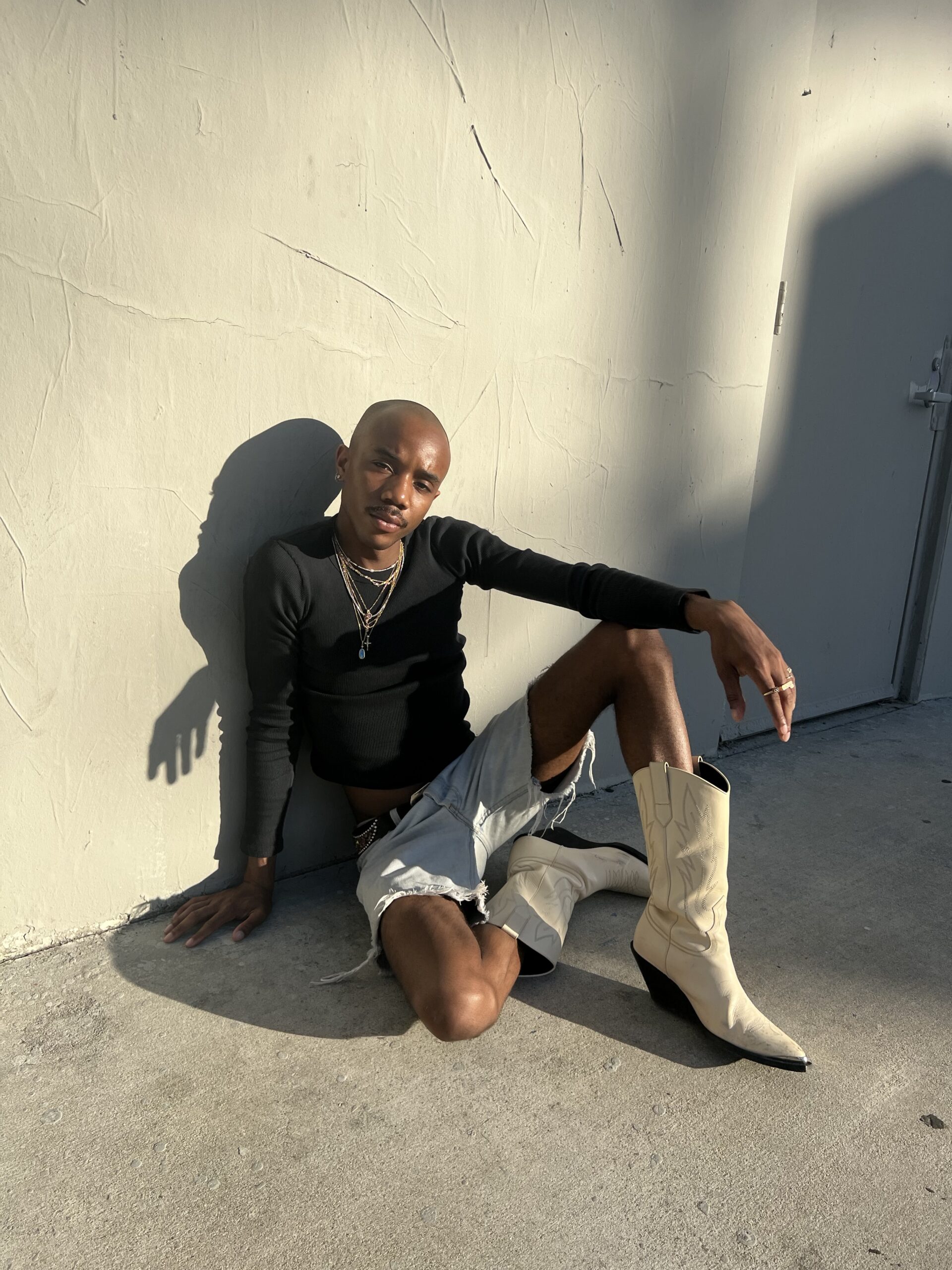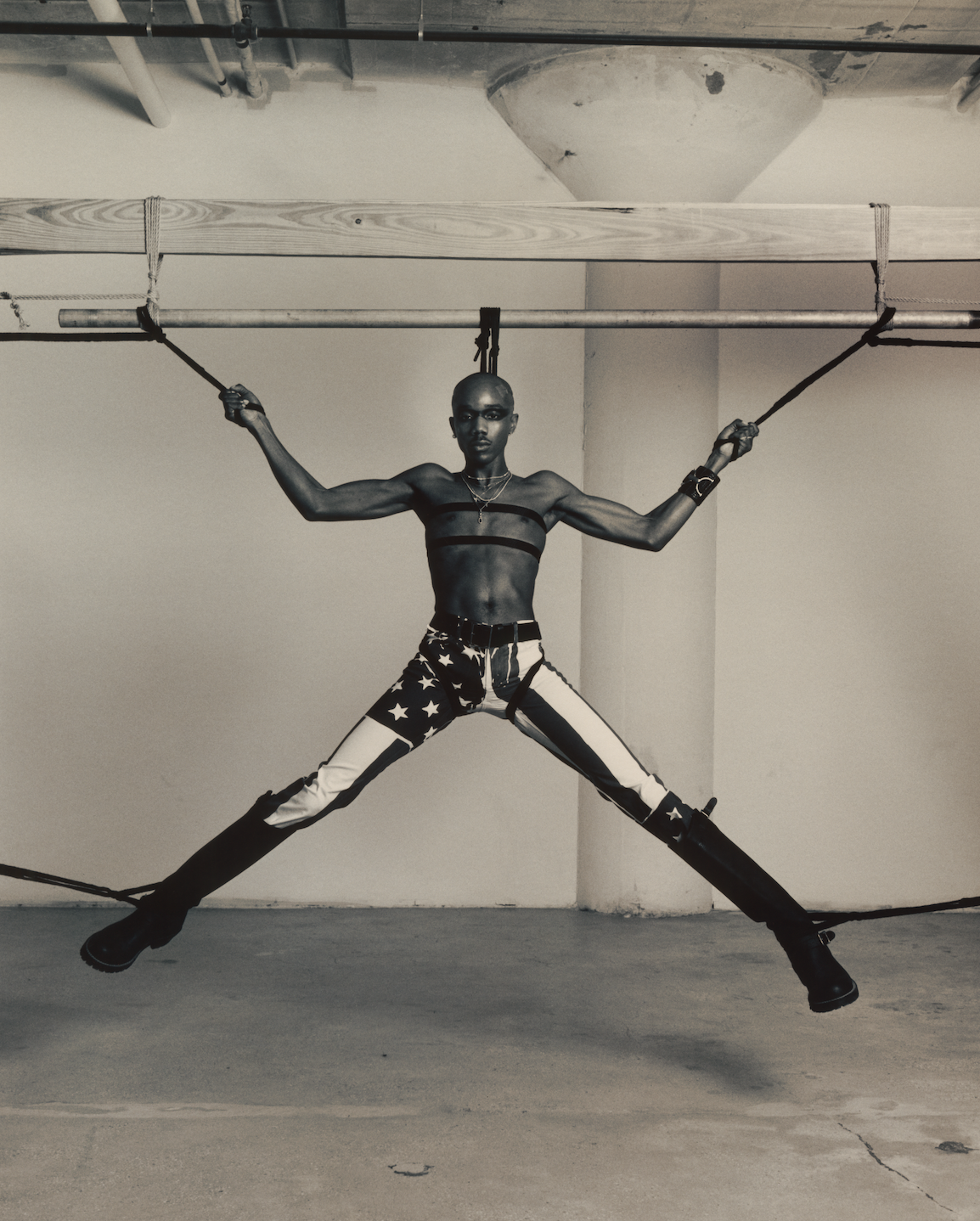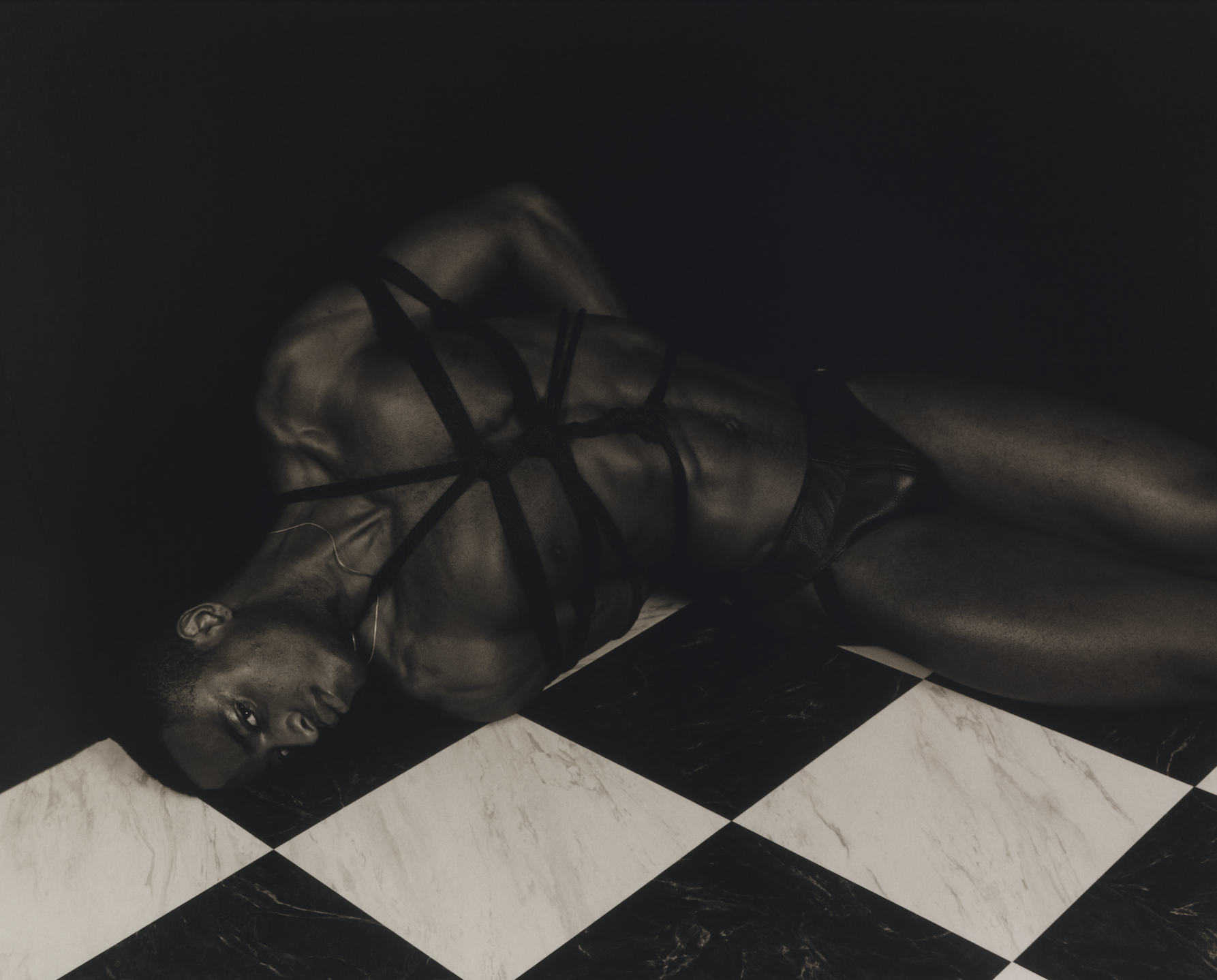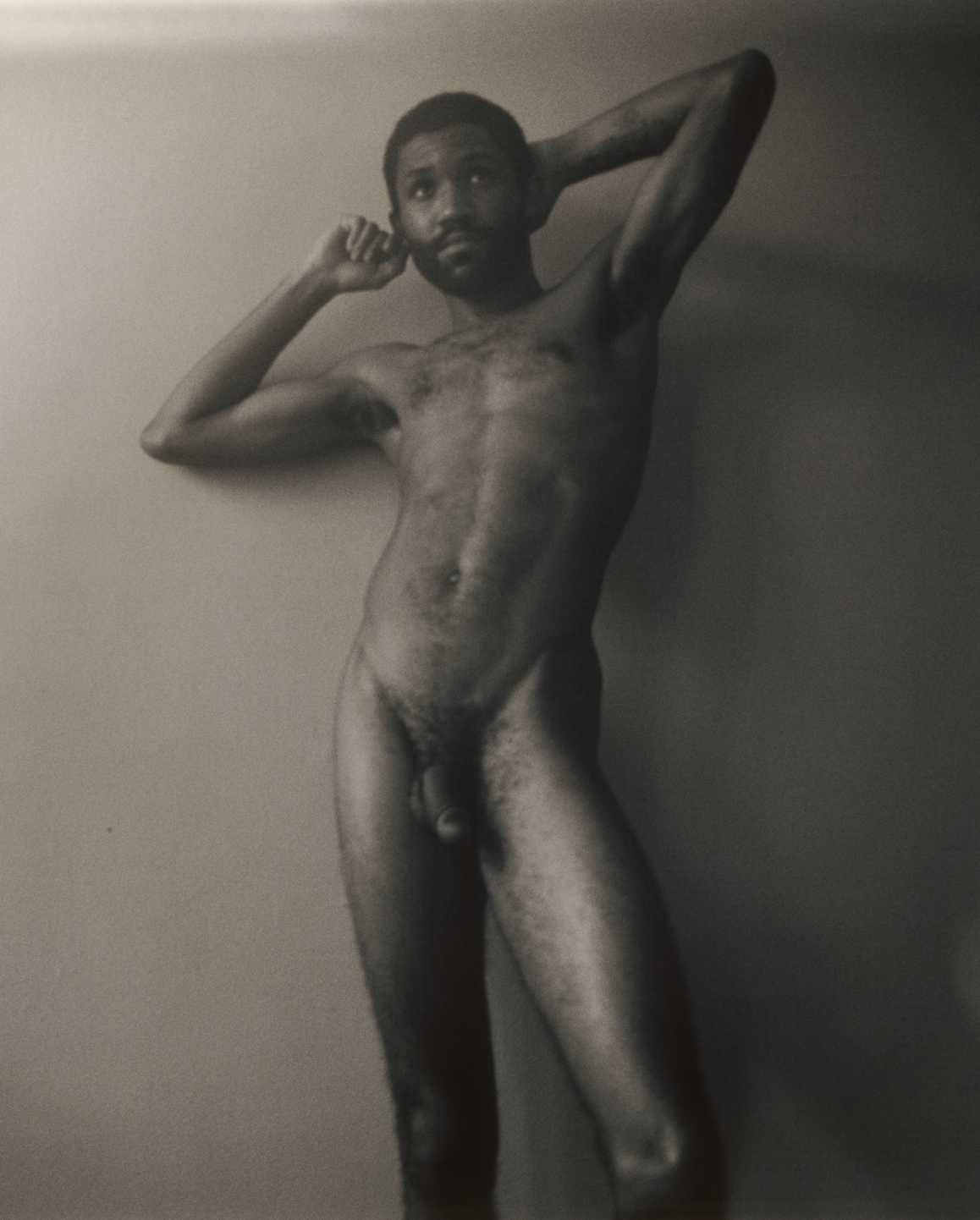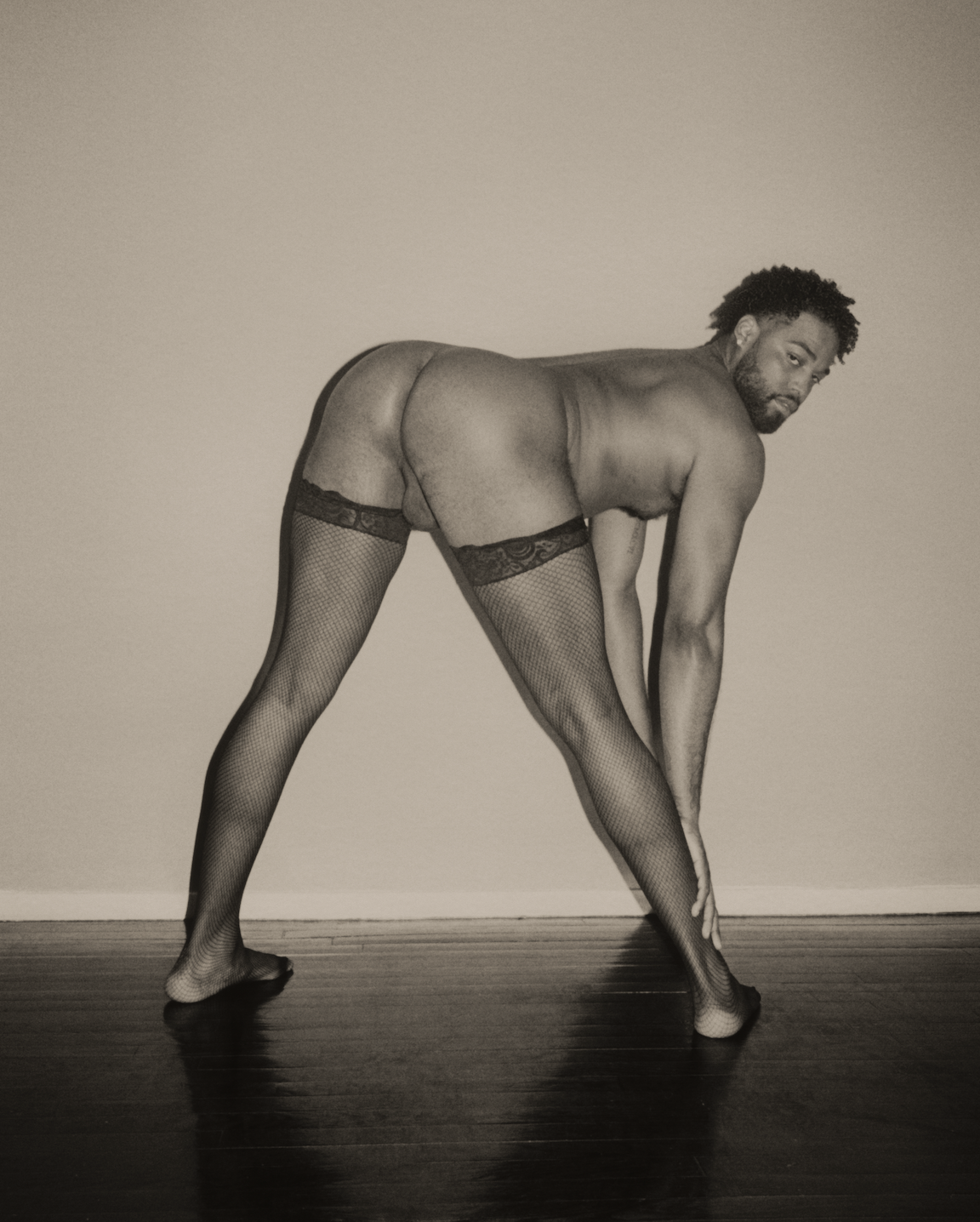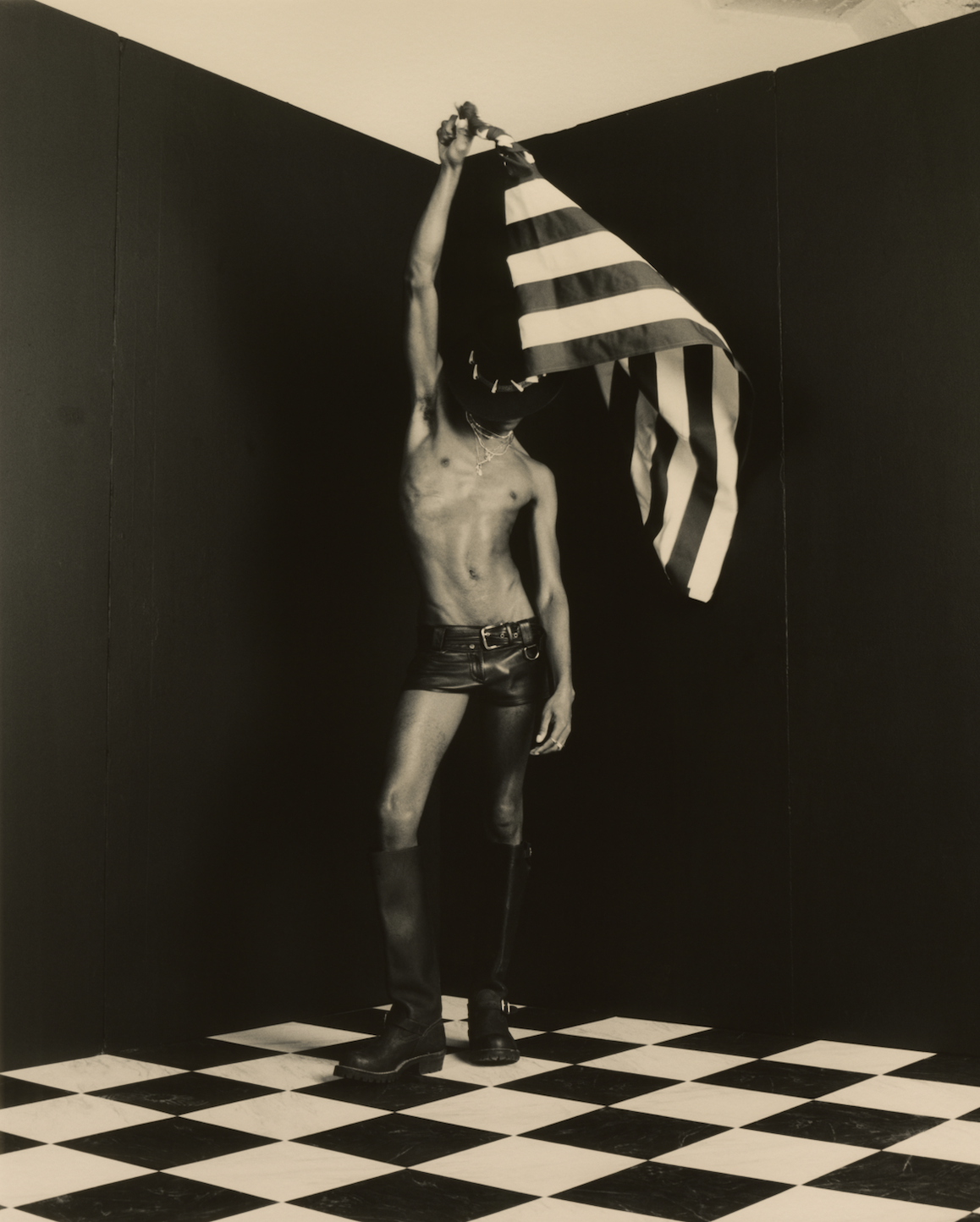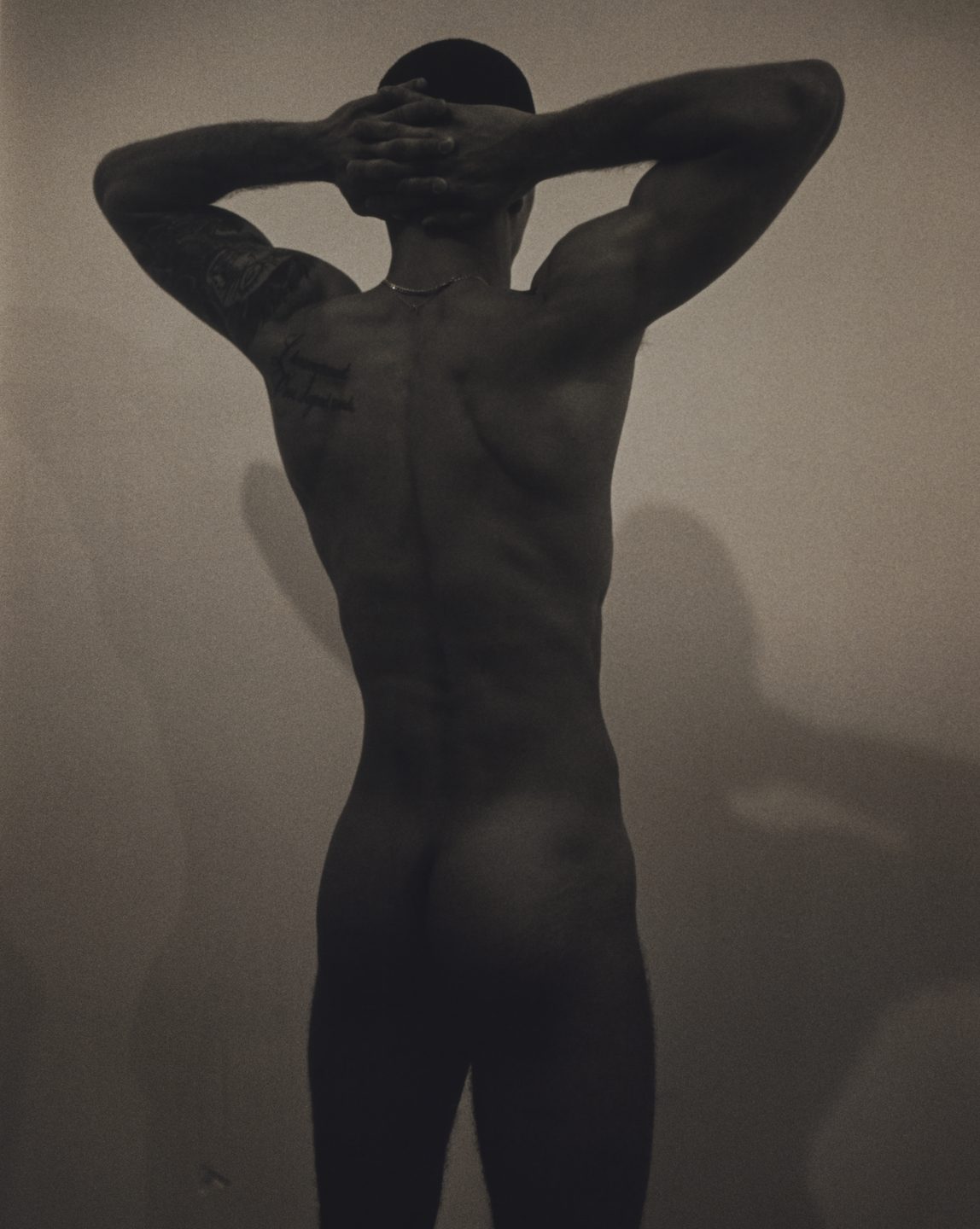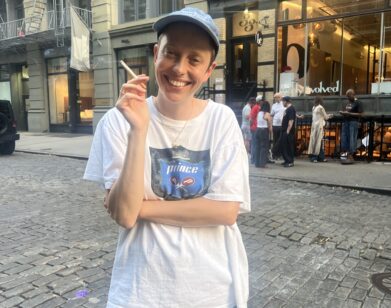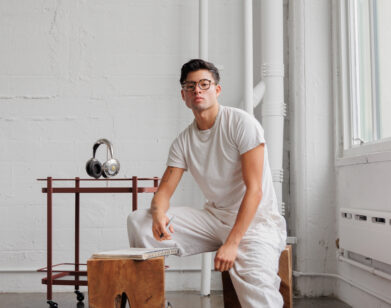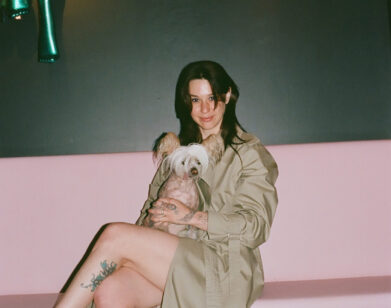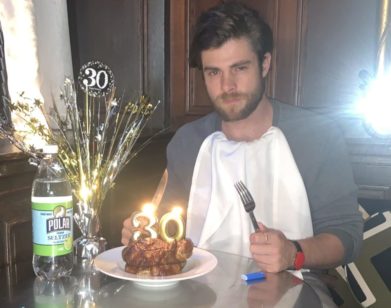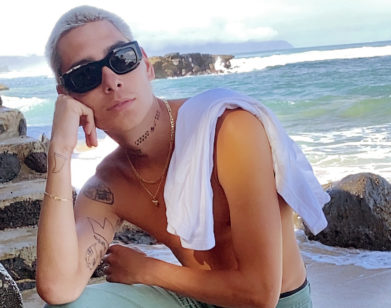IN CONVERSATION
Quil Lemons and Ryan McGinley Talk Gemini’s, OnlyFans, and Azealia Banks
Last week, the 26-year-old photographer Quil Lemons was on his way to East Sandwich, right off the Cape Cod Bay, when he got a call from his mentor Ryan McGinley. Lemons was heading north with friends to take a breather and find lobster rolls before the opening of his hotly anticipated show Quiladelphia, which opens today at Hannah Traore Gallery on the Lower East Side. A self-described “manifesto of radical queerness,” the show, which features portraits of friends, OnlyFans stars, and even himself, finds the photographer deepening many of the motifs he first explored in his 2017 photo series Glitterboy, which announced Lemons as a raw and bona fide talent. “We’re like child actors,” he told McGinley of growing up in public. “But it’s also nice to have an audience of people watch you evolve and stumble through your craft.” Pulled over at a rest stop, he and McGinley discussed astrology, Black masculinity, keeping fear at bay, and finding inspiration in the queer artists lost to AIDs.
———
QUIL LEMONS: Now I can hear you.
RYAN MCGINLEY: Where are you right now?
LEMONS: I’m headed to Cape Cod with my friends, Myles and Jeffrey. And we just had to pull over because I could not connect into the call. But I’m on the call now.
MCGINLEY: You’re going to Provincetown?
LEMONS: We’re going to East Sandwich. I don’t—
MCGINLEY: Oh, yeah. That’s on the way. That’s amazing.
LEMONS: That didn’t sound like a real place to me. I’m like, “What’s East Sandwich?”
MCGINLEY: No. It’s totally real and it’s one of the stops on Cape Cod. You’re going to have the best time. For a photographer, Cape Cod has the best light because it’s so thin, but it’s surrounded by water on each side.
LEMONS: We’re hoping that it’s not gray the entire time we’re up there, but we were just kind of wanting to get out of the city and eat some seafood.
MCGINLEY: Do you like lobster?
LEMONS: I do. I’m very big on that. And last time I was up in P-Town, I had some of the best lobster in my life, where it was just so fresh.
MCGINLEY: Cape Cod has the best lobster rolls. Anyway, I’m so happy for you and your new exhibition that’s about to open September 6th.
LEMONS: I’m really excited to just put it out into the world and I’m happy for everybody else to see it too. As we get closer, there’s a little bit of nerves, but all excitement. I’m just like, “Okay, can we just get to the point where I’m showing it to everyone.”
MCGINLEY: Well, since we’re friends, I was lucky to get a little preview of the show. I guess my first question is, what’s going on in those photographs?
LEMONS: Okay, so I feel like I’ve been saying it’s a manifesto of radical queerness. It’s just, “I am gay, and this is my world.” But there’s some people that don’t really understand what it means to be gay. This is a slice, or my POV on it.
MCGINLEY: When I look at it, it’s a big evolution from Glitterboy [Lemons’s 2019 photo series]. I love watching your work grow since I’ve known you for the last seven years now. I think the first thing that I saw was Glitterboy, and then it was stuff in the New Black Vanguard. And then when you photographed your family and all those beautiful dresses. The work is constantly evolving and you’re constantly dipping into new material. And in this work, there’s this idea of sexuality. It feels like there’s some kind of S&M going on, or some sort of kink, and there’s touchstones to old school queer photography. And then you’re elevating it to this highest art form by photographing it. Let’s talk about it.
LEMONS: I feel like this is the first project of me being really in front of the camera. I’ve done self-portraits before, but I think this one is the most honest and raw. There’s a difference between the Quil Lemon’s image and the Quil Lemons as a person, and I think those are both equally important things to my artistic practice. When making this work, I felt very present and in my body for the first time in a few years, and then it was like, “Okay, if I’m going to be in my body, I have to throw that into the world.” I think Glitterboy tapped on it really lightly, but I was younger, so it was a little bit more shy, where this is so direct when it comes to unpacking queerness and masculinity. Another thing that came up, and is coming up as I’m getting closer to sharing it, is shame. And I think that just surrounds queerness in general. And also being a black man and having ownership over my sexuality, which is queer. I wanted to really package all of those things and then communicate it, and not be afraid. There’s a lot of fear that goes into doing anything, but I can’t let that hold my work back and I can’t let it hold me back from just becoming. When I was thinking about some of these concepts, I would be like, “Oh, my god. So what does everyone else think about this?” And then I was like, “Well, I can’t let that influence or stop the work in any way either.” If that makes any sense to you.
MCGINLEY: That totally makes sense. I also was a photographer who grew up in public.
LEMONS: It’s so weird.
MCGINLEY: We’re like child actors. Had to do therapy for the rest of our lives to get through it. But it’s also nice to have an audience of people watch you evolve and stumble through your craft. And some hit, and you could do great things, then some are lessons. And you’re really out there in public. But that’s okay. That’s why I love you so much. I’m so inspired by your work. And I think the thing that I love about you most is just your energy and your curiosity, it’s so warm. There were photographers who, for me, were older mentors that gave me a lot of good advice. And it’s cool to be in that position now, to have had 20 years of photography under my belt, and pass that information on.
LEMONS: Well, first I wanted to say thank you. It’s nice to be embraced by someone whose work I really respect. A lot of your work allowed me to not be so fearful in going for it with this project. Because I’m just like, “If he’s going to do this, I’ve got to be equally as fucking cunt.” And I’ve got to go like, push the envelope in the same way and just keep expanding that canon of what’s possible for a young photographer.
MCGINLEY: Tell me about some of the influences for this show. What were you thinking about when creating these images? Where were these ideas coming from?
LEMONS: Okay, so there’s many different parts of the series that respond to different things. Ultimately, I’m envisioning a Black future that is a utopia where Blackness and queerness can live in harmony. And if it did, then we wouldn’t have an instance earlier this summer where the young Black man was murdered by another young Black man for voguing in New York. I think that that’s just insane, when both Blackness and queerness are two things that live in the “other.” So if I am presenting my queer experience and tapping into things like sexuality, sensuality, intimacy, then maybe that makes it a little bit safer for someone to be out voguing, while I’m having this up in a museum. And then I started tapping into the canon of just image-making. Queer images, because I was looking at Zanele Muholi, and of course Mapplethorpe comes up. Then Lyle Ashton Harris, and your work comes up. And as I was delving into the queer world, I started looking at all the artists that we lost due to HIV/AIDs, like David Armstrong, Mark Morrisroe. I wish I would’ve had these people here, because it would’ve added a lot of context to my work. And people wouldn’t be like, “Oh, this boy just lost his mind,” or “He’s a sexual deviant.” And it’s like, “No, this is just a part of life.” Also, I’ve felt like for so long that Black creators were so far removed from the queer image. We were in queer images, but we weren’t the person taking them or we weren’t the author. And I wanted to re-contextualize that. This first show is an edit. I have so many more images to show, and I didn’t just shoot black men for the series. My sexuality doesn’t just stop itself at being black. I like all boys.
MCGINLEY: What kind of guys do you like? What’s your type?
LEMONS: It’s all over. It just depends on the day. Some days I’m a little bit more femme, some days I’m more masc, and I just need someone to be able to understand that. So it’s just like, if you understand that, I’m probably going to be into you.
MCGINLEY: I love watching you walk down the street in some cowboy boots and some short shorts. You’re always serving masculinity and femininity at the same time.
LEMONS: It’s funny because I sit in Dime Square with my friends and we literally play Smash or Pass just for shits and gigs. But we get to understand each other so much better. “Oh okay, wait. I didn’t think you would be into this person, or I didn’t think you would be into that person.” And I think it just keeps expanding how we see ourselves, what we find attractive versus what should be attractive to us. And I think we’re completely shattering that, too.
MCGINLEY: Let’s get a little nerdy and talk about technical photography stuff. Can you tell me about what you shot these photos on?
LEMONS: Yeah. So, being a super photo nerd at this point, most times I’m shooting it’s 120. So half of the images were shot that way. Then, in thinking about the project and where I wanted to go as a photographer, I wanted to really democratize my style and lens. So then I got a contact and I went back to 35 with a Canon AE1. I do love the immediacy and the quickness of shooting on 35, especially when it’s automatic. So I went from manual to automatic, and then back to 120. And I think it allowed a different level of intimacy because it wasn’t like, “Oh, you need to hold that pose.” It was like, “No, we can speed through. We can just knock off four roles like this.” Then, if I found a pose that I really liked, I’d be like, “I’m going to shoot this at 120.” Going back and forth really freed me and my mind when it came to image-making. And now I’m so excited to bring that back into my commercial work and my editorial work. I wanted to shoot my queer family, which is always constantly growing. So it was mixing up from people that are traditional models to friends, to people I followed on OnlyFans, to just everyone that was coming in contact with me. Sso that means they were probably going to be coming in contact with masculinity. And I was also interested to see where they fell in understanding their own masculinity.
MCGINLEY: Who’s your favorite OnlyFans?
LEMONS: It’s probably going to be this dude Fat Rabbit Killer. He has the best OnlyFans out there. He can literally make someone go from being a small creator to one of the top performers overnight. There’s this other one, Sharok, and King Mateo. I think they’re all very different. And that’s where my attraction goes all over the place.
MCGINLEY: What’s your sign?
LEMONS: Oh, I’m a Gemini. It’s a polarizing mix of people when you say Gemini, and people have such wild and different opinions on them.
MCGINLEY: Who are your favorite Geminis out in the world?
LEMONS: Azealia Banks, for sure. I love Azealia Banks’s mind. I think it’s one of the most pure forms of the Gemini mind. Also I think her opinions are so accurate and so true. I love when her story goes into small Instagram dots and she’s just giving a full dissertation about whatever topic she’s talking about. And, if anyone’s a Gemini, Kanye; you have to appreciate Kanye for his contributions to Blackness, art, music, everything that he’s touched. Those are the top two Geminis that I would just love to meet.
MCGINLEY: I’m ready for a Quil Lemons museum exhibition. Are there any museums in New York that you’re ready to show at?
LEMONS: The New Museum would be one of my favorites just because I think the curation of that museum is just ahead of itself in a lot of ways. I love the Studio Museum, when that opens up in Harlem. I’m excited to see what they do. The ICP, of course. And of course the MoMA. But I’m like, “I want the MoMA for a retrospective.”
MCGINLEY: I love that so much. So you’re opening on September 6th. Is Philadelphia going to be in the house? Are all the Lemons going to be coming through?
LEMONS: My younger siblings won’t be coming through because of the level of nudity, but a lot of my family will be present, as they always are. And half the models that I’ve shot are from Philly, too. That’s why I had to name the show Quiladelphia. One, that’s the city of brotherly love. My city is so prideful and I think it’s the one place that always grounds me. There was no other name that made sense.

